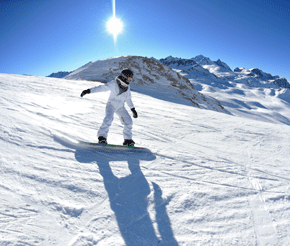Winter Sports and UV Exposure – Myths vs. Facts
 With winter snows, many of us are looking forward to spending the short days in the fresh powder. There are many outdoor sports to enjoy: skiing, snowboarding, winter camping, ice climbing, skating and sledding are just some of the choices for winter sports.
With winter snows, many of us are looking forward to spending the short days in the fresh powder. There are many outdoor sports to enjoy: skiing, snowboarding, winter camping, ice climbing, skating and sledding are just some of the choices for winter sports.
But what about eye protection? Is it really necessary? Because the sun’s force is reduced in the winter, are your eyes safe from overexposure to UV rays?
Every day – whether it is sunny or cloudy, and despite the season – we are exposed to ultraviolet (UV) radiation from the sun. UV radiation can’t be seen or felt, but over time it can have a damaging effect on the eyes. Unprotected exposure to UVA and UVB radiation can lead to serious health issues including damage to the eye’s retina and skin cancers. Even during the winter it is important to always protect your eyes by wearing sun wear that provides UVA/UVB protection. Fresh snow reflects nearly 80 percent of UV radiation, and UV rays can bounce off frozen water, increasing exposure. At high altitudes, thinner air allows for the passage of even more light. UV radiation goes up 3% for every 1300 feet of altitude. Even when it’s overcast the amount of reflected light can be magnified so that your eyes are at risk. Skiers, snowboarders, ice skaters and others engaged in snow or ice sports should take special care to protect eyes by wearing wraparound sunglasses or goggles.
Which sunglasses are the best for snow sports? There are two things that are the most important to keep in mind when making this decision:
The first factor is how to help you view your surroundings. In the wintry outdoors, you are surrounded by white and gray. In addition, the white is extremely reflective. Sunlight bounces off the snow as efficiently as off tiny mirrors. Your mother told you never to stare at the sun, but when you’re on a snow field, you really don’t have a choice; the sunlight is everywhere. The best thing you can do is wear sunglasses that absorb most of the glare, and polarized sunglasses are by far the best purchase to make in this regard. By eliminating both the reflected sunlight from the snow and the diffused sunlight that comes directly downward, properly polarized sunglasses remove the strain from your eyes and provide an incredibly clear view. There will be no need to squint, and whatever outdoor activity you are participating in will become more enjoyable.
Protecting your eyes with appropriate sun wear/sports protective eyewear is essential to safely enjoying winter sports and activities and can also help you perform your best. Polycarbonate sports eyewear is specifically designed to protect and enhance the performance of the athlete, and polycarbonate sun wear will protect the eyes from harmful UV rays.
There is no need to give up the winter activities you enjoy. Wearing appropriate sports protective eyewear with polycarbonate lenses will protect your eyes, and you can limit winter UV exposure even more with wraparound sunglasses or goggles that block UV rays.

Comments